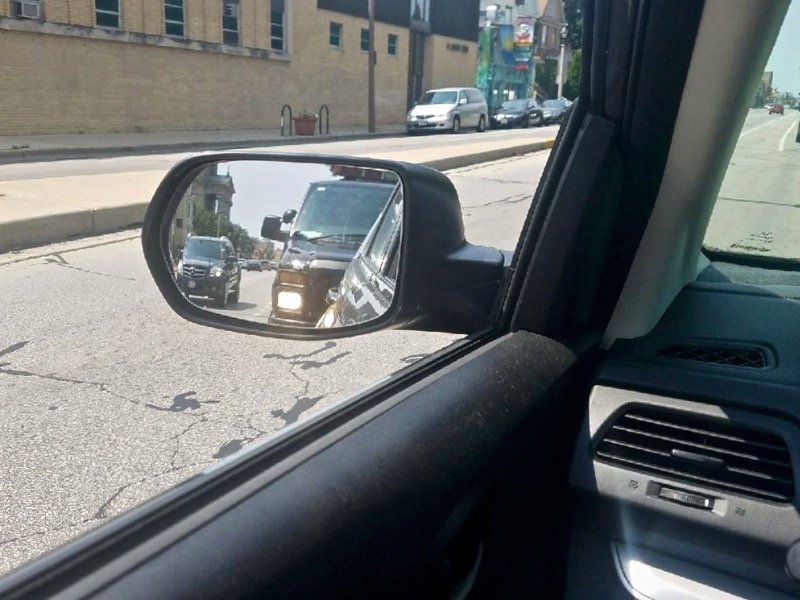The opinions expressed in this piece do not necessarily reflect the opinions of OnMilwaukee.com, its advertisers or editorial staff.
The decline of the Milwaukee Journal Sentinel (and, yes, it’s been a steady decline) has been a very sad thing to watch from afar, especially for someone, like me, whose family has been tied to 4th and State off and on since at least the 1930s. The newsroom, at least when I was there a year ago, felt like a ghost town, at least comparatively. It used to be an electric place.
There’s some really good work that still goes on at 4th and State, generating a lot of Pulitzer hardware. Correct that: There’s some great work that happens there, and I used some of it in one of my classes at UW-Milwaukee earlier this week as an example (Raquel Rutledge’s series on daycare fraud).
There’s some not so good work that goes on down there too, but there’s no need to dwell on that. Whether you like the current version of the paper or not, we should all agree: It’s good for civic life overall. We need our urban daily to not only survive here but to thrive.
I say that as a fan and teacher of innovative and modern online formats and –obviously, since you’re reading this – a writer for one. It’s not the paper and ink I’m wedded to, though – although I also have a weekly column in the Waukesha Freeman printed product. It’s the print ethos I prefer, whether the words are written in ink or on the web. I admire reporters who ask tough questions, and use context and details.
On an information highway glutted with opinion, rumor, abridged articles and partisan sites, not to mention TV stations that too often traffic in endless fragmented disorder imagery, it’s nice to know there are still people in town willing to sit at school board and Common Council meetings, and pore through records obtained through open records requests – and that someone will pay them to do it. I think we need more of that. The Journal Sentinel does a lot of this reportorial heavy lifting.
Unfortunately, I don’t see the big announcement Thursday that the national Gannett chain purchased the paper and its parent company as a good thing moving in the right direction. I say this despite the boosterish comments from publisher Betsy Brenner, whose legacy seems to be presiding over never-ending buyouts even as she promises robust coverage that seems to occur less than it used to.
My first visit to the old Milwaukee Journal newsroom occurred when I was about age 5. It’s literally my first memory. My grandfather, Raymond McBride, walked me into the newsroom. I remember the smell of his pipe, and how exciting and busy the whole place seemed. Ever since that moment, being a journalist was all I ever wanted to do. I was actually in the paper first when I was about 1 or 2. They ran a picture of me on the fashion page in a little dress.
My grandfather was a reporter and columnist, including for the Green Sheet for the Journal for more than 40 years, writing about his big, boisterous Irish-American family. My grandmother Marian "Toni" McBride was a pioneering female political reporter for the Sentinel. I used to look at her old press passes when I was a kid. She had them in a photo album in their dusty old attic in Wauwatosa. They only let her cover women’s issues back then. She helped integrate the Milwaukee Press Club.
I got my own start at the paper as a gopher delivering mail and coffee to Sentinel reporters in about 1991. I was a Journal sports agate clerk, a Sentinel intern, a part-time Journal suburban reporter and then a full-time reporter at the Journal Sentinel for a decade, leaving for UWM in 2004. So I get and understand what it was and why it still matters.
Here are five reasons the Gannett purchase is bad for Milwaukee – and one reason it might not be:
1. The corporate HQ won't be here
It’s almost never good to have the corporate headquarters located outside the town you cover as it will be now, creating an ever distant set of decision-makers not connected to our place. A big chain, with a lot of papers in the Fox Valley and throughout the country, is more impersonal. That’s the big change here. It’s also bad for Milwaukee and Wisconsin any time a corporation decides we’re an OK region for an outpost but not a mothership. The Journal Sentinel won’t be the heavy hitter in the chain anymore, either. It has bigger fish, like USA Today. It raises the prospect the building downtown will go too.
2. The potential for more canned content
We can probably expect to be a lot more educated about the goings on in Appleton and Green Bay, as Gannett may find it tempting to share content among its Wisconsin papers. They might consolidate the reporting staffs of operations where that makes sense too, like statewide beats concerning politics or the state legislature. That’s bad. More watchdogs over government is good for democracy; the Journal Sentinel’s state coverage is some of its best. Any further shrinkage of the number of bodies covering the statehouse means fewer people being held accountable and less original content for the rest of us to share and bicker about.
It’s also a recipe for consolidation that could lead to canned national content of the USA Today glitzy and brief (but super colorful!) variety. We’ll probably end up with a paper that reads a lot like USA Today with a local wrap around it. I remember the days when the wrap around was hyper local over local, say the Waukesha Journal over the Milwaukee Journal; now I fear we will get some local stuff from Milwaukee wrapped around USA Today and mixed together with Green Bay.
On the other hand, every time the paper shrinks, other entrepreneurs tend to fill the hole. There’s always a market for information.
3. Less investment in the community's concerns
Local people who own local papers that cover local things as their primary business put more emphasis and resources into the communities they love and serve. They can be freer to take gutsy but needed stands. People making the big decisions from afar, when they don’t really get the vibe of the town, can make disastrous decisions not in our best interest.
There’s a loss of heritage here. Historically, the old Sentinel and old Journal took gutsy stands on major issues of national and state concern, whether it was championing abolition or challenging Joe McCarthy. A family-owned, independent company can risk doing that. I’m not so sure cautious corporate bean counters from other states would allow controversial crusades to happen locally. The Sentinel goes back to the 1830s and historic Milwaukee figures like Solomon Juneau and Rufus King. We may see a more neutered version of these once fiery, crusading papers.
4. More media consolidation in the country overall
I prefer a fractured media in which citizenry is empowered to own the press, leading to a multiplicity of viewpoints and coverage from different perspectives on the same event. In that way, I love the media revolution of the Internet; the fact anyone can publish is good.
More media consolidation of the big players, though, across the country doesn’t strike me as a great trend, although at least Gannett is putting its spirit behind newspapers, because I like newspapers. I always thought the logical consolidation would be to combine the news staffs of the paper and its sister TV station, but instead the media trend has been to spin broadcast properties off from print.
5. The potential for more layoffs
"No details have been discussed," Brenner said on the radio Thursday, when asked about layoffs, although she said the chain has respected local talent in other states.
When have the various changes at 4th and State been good for the community in terms of more coverage and greater resources? People forget that the Hearst chain (which owned the Sentinel for years) shut the Sentinel down once because it needed the money for other outlets in its chain, which is why the Journal bought it.
Eventually, the company did the obvious: It merged its two papers. This wasn’t great, either. I liked it when the Sentinel and Journal competed; I remember when reporters would run to the pay phone so the reporters from the other paper wouldn’t hear their stories, and I remember when press rooms were bursting with people. Now some aren’t even open anymore.
Milwaukee lost something when the papers merged, and it was no longer a two-daily newspaper town. It just did. I remember when it used to take me an hour to read the Sunday newspaper over my cup of coffee; now I skip through it.
Then there was the Scripps takeover. It didn’t seem like the paper grew more robust after that or that the reporting was more thorough. In fact, there were big news stories I learned about first through social media, and that never used to happen. The employees have been fiscally brutalized through obliterated stock prices that had been stable for years.
I’ve long ago lost track of the many good people who have gone on in the never-ending spiral of buyouts. Great reporters, whose bylines we no longer get to read. It just doesn’t seem like it’s gone in the right direction. A large chain will want to consolidate not just content but operations. Expect that some additional local people won’t have jobs by the time this is done. That’s not good.
Now, the reason the takeover might be good.
The Gannett takeover is good if it keeps the newspaper’s doors open. I’m not saying the paper was in danger of imminently closing, but at least with a big chain, the losses can be shared and more easily weathered. Brenner went on the radio today and pointed out that Gannett has vast resources and great reach.
Mass market urban dailies all through the country have struggled to figure out an online profit margin in the world of Craigslist and a culture that’s convinced people information should be free. Lots of people read the paper’s information; they just don’t pay for it.
Newspapers are not dying or dead. I just returned from the National Newspaper Association Convention in Missouri, and many of the publishers there were chafing at that misperception. Community newspapers and ethnic newspapers are making it with a printed product. Online-only publications thrive. They have a niche audience, and there is nowhere else for the local advertisers to go. Not so in a big city market, though, where mass market urban dailies struggle (especially in towns where there were two). They are often still profitable – people forget that – just less so. Their staffs seem to be shrinking to the size of a TV newsroom, frankly, where more people are generalists because there’s not enough staff power for specialists.
It’s good, though, to see a chain put so much investment behind the power of and ownership of newspapers. As Thomas Jefferson famously said, "Were it left to me to decide whether we should have a government without newspapers, or newspapers without a government, I should not hesitate a moment to prefer the latter."
I care about that. A lot. Some of the Gannett papers are small but good. I just had one of our UW-Milwaukee alums back in my class speaking to freshmen students interested in media careers. Ironically, she works for a small community biweekly owned by Gannett. A finer young journalist there isn’t. She is invested in the community she serves, and distant ownership hasn’t deterred that. It’s just given her stories a broader national audience.
If we see more of that kind of rich local coverage here, good. However, I’m doubtful.
Jessica McBride spent a decade as an investigative, crime, and general assignment reporter for the Milwaukee Journal Sentinel and is a former City Hall reporter/current columnist for the Waukesha Freeman.
She is the recipient of national and state journalism awards in topics that include short feature writing, investigative journalism, spot news reporting, magazine writing, blogging, web journalism, column writing, and background/interpretive reporting. McBride, a senior journalism lecturer at the University of Wisconsin-Milwaukee, has taught journalism courses since 2000.
Her journalistic and opinion work has also appeared in broadcast, newspaper, magazine, and online formats, including Patch.com, Milwaukee Magazine, Wisconsin Public Radio, El Conquistador Latino newspaper, Investigation Discovery Channel, History Channel, WMCS 1290 AM, WTMJ 620 AM, and Wispolitics.com. She is the recipient of the 2008 UWM Alumni Foundation teaching excellence award for academic staff for her work in media diversity and innovative media formats and is the co-founder of Media Milwaukee.com, the UWM journalism department's award-winning online news site. McBride comes from a long-time Milwaukee journalism family. Her grandparents, Raymond and Marian McBride, were reporters for the Milwaukee Journal and Milwaukee Sentinel.
Her opinions reflect her own not the institution where she works.







